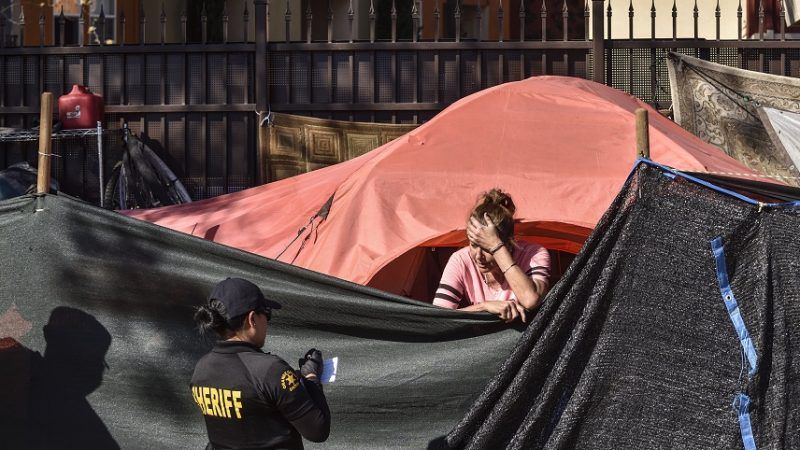6 Points to Consider in the Debate About Homelessness
Policymakers need to focus more on harsh realities if they want real solutions.

It's amazing what a civil rights lawsuit and some federal judicial muscle have done to force officials in California to address the vexing homelessness problem in Orange County, especially in the dreary encampments along the Santa Ana River trail. Judge David Carter excoriated county and city officials during an unorthodox court proceeding on Tuesday that produced in hours an agreement that had been elusive during weeks of wrangling.
The deal lets local governments clear out the sprawling camps in exchange for providing 30-day emergency vouchers for people to stay at motels. The Orange County Board of Supervisors also announced that it will soon provide more than 300 additional beds or tents for the homeless at facilities around the county.
Homelessness isn't just an Orange County problem, of course. It's a growing mess throughout California and the nation. I've seen communities of all sizes and political dispositions wrestle unsuccessfully with it for decades. Cities such as San Francisco that throw money at the problem become magnets for homelessness, with sections of the city resembling an outdoor sewer.
Other communities, including Los Angeles, have tried to more aggressively roust the people sleeping under freeways, along riverbeds and in public parks. But this does little long-term good. There's a reason they are called homeless people. They have no place to live, so they just push their shopping carts somewhere else.
Nothing really works and it's cost prohibitive to build enough shelters for everyone. And some of the homeless are essentially feral—they're not going to live in a shelter (especially ones that forbid drug and alcohol use) even if it's offered. Judge Carter made reference to that point: "Some will take advantage and some won't. Some who want to wander will wander. Some who want to leave will leave."
While there might not be any simple solutions, there are some points that policymakers ought to consider as they wrestle with the problem:
First, officials should stop doing things that make things worse. Years ago, the city of Anaheim was so insistent on "cleaning up" cheap motels that dotted Beach Boulevard that it passed a law that forbade people from living there. Residents were forced to leave every 30 days. These motels had become the last step before homelessness, so you can guess what happened. It still strikes me as an example of what not to do.
Second, it's foolish to depend fully on the public sector to "fix" the problem, even though this is a legitimate area for government intervention. Governments are incapable of efficiently fulfilling even their most fundamental purposes (infrastructure, public safety, etc.). So hopefully there's a much bigger role for nonprofits and private efforts.
Third, let's realize that homelessness isn't primarily a problem about a lack of homes. Jim Palmer, president of the Orange County Rescue Mission, told me that 58 percent of the people who sought services from the mission in 2016 and 2017 self-identify as having a chemical dependency. And 33 percent stated that they have a mental illness.
Fourth, homeless advocates need to realize that not everyone who is upset at nearby homeless congregations is being mean. Most everyone wants these troubled people dealt with humanely. But no one has a right to set up a camp on public land or on someone else's private property. I've seen once-lovely city parks turn into disgusting and foreboding places. "It's the wild west," Palmer said about the encampments. I've had homeless people defecate and leave heroin needles on my property. There are serious crime issues. I love when charities feed the homeless, but have seen massive camps sprout in neighborhoods around food centers. The public has legitimate concerns.
Fifth, we need to call out shortsighted policies when we see them. Last month, homeless activists were arrested in the city of El Cajon for feeding homeless people in a city park. City officials there justified their policies as a way to combat a hepatitis A outbreak. (Some argue that such outbreaks are caused by the state's ban on plastic bags, which homeless people had used to clean up after they poop.) Is it unreasonable to expect a city to come up with more constructive approaches than sending police?
Sixth, we need to realize that state policies have unintended consequences. The homeless aren't living in tents simply because they couldn't come up with rent for an apartment. But excessively high home prices—driven by the state's land-use controls—create pressure at every level. They reduce the availability of cheap apartments and shelters. Furthermore, some criminal-justice policies reduced the jail population and many of those released joined the ranks of the homeless.
So maybe Orange County's deal was a decent resolution to an impasse, but it will barely scratch the surface. There are no easy answers, of course, but it would be nice if state and local officials tried thinking more creatively about this growing problem.
This column first appeared in the Orange County Register.

Show Comments (53)